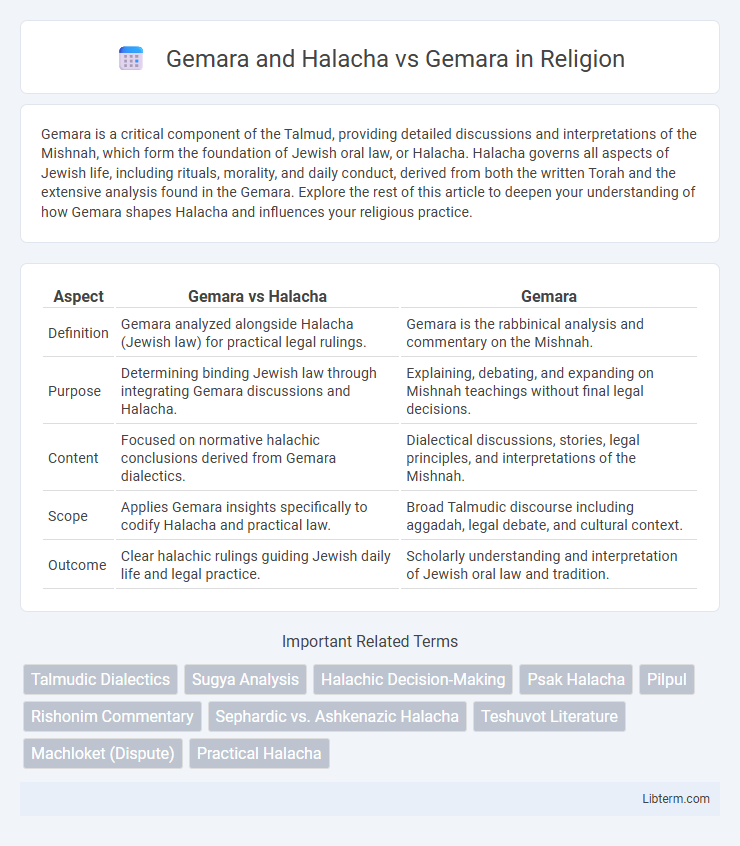Gemara is a critical component of the Talmud, providing detailed discussions and interpretations of the Mishnah, which form the foundation of Jewish oral law, or Halacha. Halacha governs all aspects of Jewish life, including rituals, morality, and daily conduct, derived from both the written Torah and the extensive analysis found in the Gemara. Explore the rest of this article to deepen your understanding of how Gemara shapes Halacha and influences your religious practice.
Table of Comparison
| Aspect | Gemara vs Halacha | Gemara |
|---|---|---|
| Definition | Gemara analyzed alongside Halacha (Jewish law) for practical legal rulings. | Gemara is the rabbinical analysis and commentary on the Mishnah. |
| Purpose | Determining binding Jewish law through integrating Gemara discussions and Halacha. | Explaining, debating, and expanding on Mishnah teachings without final legal decisions. |
| Content | Focused on normative halachic conclusions derived from Gemara dialectics. | Dialectical discussions, stories, legal principles, and interpretations of the Mishnah. |
| Scope | Applies Gemara insights specifically to codify Halacha and practical law. | Broad Talmudic discourse including aggadah, legal debate, and cultural context. |
| Outcome | Clear halachic rulings guiding Jewish daily life and legal practice. | Scholarly understanding and interpretation of Jewish oral law and tradition. |
Understanding Gemara: Foundations and Structure
Understanding Gemara involves grasping its dual role: elaborating on the Mishnah through dialectical analysis while serving as the foundation for Halacha, Jewish law. Gemara expounds on legal principles by dissecting Tannaitic teachings, providing detailed discussions that clarify Halachic rulings. This layered structure enables learners to trace the evolution of Jewish law from textual study to practical application.
What is Halacha? Defining Jewish Law
Halacha, derived from the Hebrew root "halach," meaning "to go" or "to walk," represents the comprehensive body of Jewish law guiding religious practice, ethics, and daily life. While the Gemara is a Talmudic component containing rabbinical interpretations and discussions of the Mishnah, Halacha refers specifically to the practical legal rulings and codified Jewish law extracted from these texts. Understanding Halacha involves studying its development through the Gemara's analytical debates, which clarify and apply Torah commandments to real-world situations.
Gemara and Halacha: Interconnected Roles
Gemara and Halacha serve interconnected roles within Jewish law, with Gemara providing detailed Talmudic analysis that elucidates and interprets the Mishnah's legal texts. Halacha emerges from this rigorous study as the practical application of these discussions, forming the foundation of Jewish legal observance and ethical conduct. Together, Gemara's scholarly discourse and Halacha's codified rulings ensure the transmission and implementation of Jewish law across generations.
Distinguishing Gemara from Halacha
The Gemara is a component of the Talmud that contains rabbinical discussions, interpretations, and analyses of the Mishnah, forming the basis for deriving Jewish law. Halacha, on the other hand, comprises the practical legal rulings and commandments that govern daily Jewish life, often codified from principles found within the Gemara. Distinguishing Gemara from Halacha involves recognizing the Gemara as the analytical dialogue and source material, while Halacha represents the finalized legal decisions and applications derived from that study.
How Gemara Shapes Halachic Decisions
The Gemara serves as a critical component of the Talmud that analyzes and interprets the Mishnah, providing dialectical discussions that clarify Jewish law. It shapes halachic decisions by offering detailed reasoning, addressing contradictions, and presenting various rabbinic opinions that guide contemporary authorities in applying Halacha. Through its rigorous debate and elucidation, the Gemara forms the foundation for codifying practical Jewish legal rulings.
The Process: From Talmud Study to Halachic Application
The process from Gemara study to Halachic application involves deep analytical examination of the Talmudic text, focusing on sugyot (topics), dialectical arguments, and clarifications by Rishonim and Acharonim. Scholars extract practical Halachic rulings by interpreting the underlying principles and resolving apparent contradictions within the Gemara, utilizing codes like the Shulchan Aruch for practical legal guidance. This method ensures that Halacha remains rooted in Talmudic discourse while adapting to evolving circumstances and real-world application.
Historical Development: Gemara vs Halacha
The Gemara represents the analytical component of the Talmud, focusing on the discussions and interpretations of the Mishnah, while Halacha embodies the practical legal rulings derived from these studies. Historically, the Gemara developed between the 3rd and 5th centuries CE in both the Babylonian and Jerusalem Talmuds, serving as the foundation for Halachic decisions that evolved over subsequent centuries through rabbinic codifications. The transition from Gemara to Halacha reflects a process where complex dialectical arguments were distilled into authoritative Jewish law guiding everyday religious and ethical conduct.
The Importance of Context in Gemara Interpretation
Understanding the importance of context in Gemara interpretation is crucial for distinguishing between Gemara and Halacha. The Gemara contains extensive dialectical discussions, exploring multiple opinions and legal principles, whereas Halacha represents the practical Jewish law derived from these debates. Accurate interpretation requires analyzing the surrounding text, historical background, and the interplay between differing views to apply Gemara teachings correctly in Halachic rulings.
Contemporary Relevance: Gemara, Halacha, and Modern Life
Gemara serves as the comprehensive analysis and discussion of the Mishnah, providing the foundation for Halacha, the codified Jewish law guiding daily conduct. In contemporary life, Halacha adapts Gemara's principles to address modern ethical dilemmas, technological advancements, and societal changes, ensuring Jewish law remains relevant and applicable. This dynamic interplay allows for continuous interpretation and application of ancient texts in issues such as medical ethics, business practices, and digital communication.
Summary: Integrating Gemara and Halacha in Jewish Practice
Gemara provides detailed Talmudic analysis and debates that underpin Halacha, the codified Jewish law guiding daily religious and ethical behavior. Integrating Gemara and Halacha ensures that practical Jewish law remains deeply rooted in the rich interpretive tradition of the Talmudic sages. This synthesis allows for a dynamic yet authoritative application of Judaism's legal framework in contemporary practice.
Gemara and Halacha Infographic

 libterm.com
libterm.com